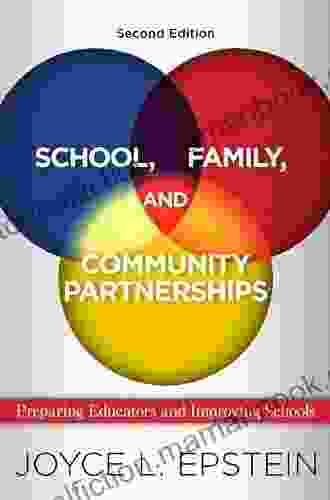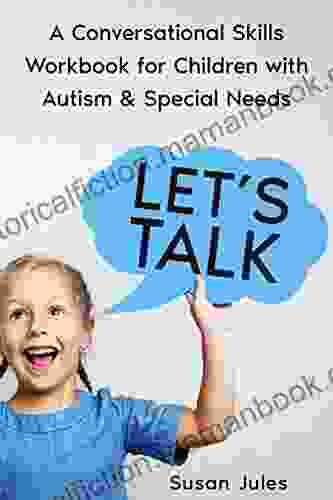Conversational Skills Workbook for Children with Autism: A Comprehensive Guide to Building Communication Skills

Children with autism spectrum disorder (ASD) often face challenges in developing conversational skills. These challenges can include difficulty understanding social cues, initiating and maintaining conversations, and using appropriate language and tone. As a result, children with ASD may struggle to build relationships and participate fully in social activities.
The Conversational Skills Workbook for Children with Autism is a comprehensive guide to help children with ASD develop the skills they need to communicate effectively. The workbook is divided into four sections:
- Section 1: Understanding Social Cues
- Section 2: Initiating and Maintaining Conversations
- Section 3: Using Appropriate Language and Tone
- Section 4: Applying Conversational Skills in Real-Life Situations
Each section includes activities and exercises that are designed to help children with ASD learn and practice the skills they need. The workbook also includes tips for parents and caregivers on how to support their child's development of conversational skills.
4.3 out of 5
| Language | : | English |
| File size | : | 3340 KB |
| Text-to-Speech | : | Enabled |
| Screen Reader | : | Supported |
| Enhanced typesetting | : | Enabled |
| Word Wise | : | Enabled |
| Print length | : | 345 pages |
| Lending | : | Enabled |
One of the most important aspects of conversation is understanding social cues. Social cues are nonverbal signals that people use to communicate their thoughts and feelings. These cues can include facial expressions, gestures, and body language. Children with ASD often have difficulty understanding social cues, which can make it difficult for them to interact with others.
The Conversational Skills Workbook for Children with Autism includes a number of activities and exercises that are designed to help children with ASD learn to understand social cues. These activities include:
- Identifying facial expressions: Children are shown pictures of different facial expressions and asked to identify the emotion that is being expressed.
- Interpreting gestures: Children are shown videos of people using gestures and asked to interpret the meaning of the gestures.
- Understanding body language: Children are shown videos of people using body language and asked to interpret the meaning of the body language.
Initiating and maintaining conversations is another important aspect of communication. Children with ASD often have difficulty starting and keeping conversations going. This can make it difficult for them to make friends and participate in social activities.
The Conversational Skills Workbook for Children with Autism includes a number of activities and exercises that are designed to help children with ASD learn to initiate and maintain conversations. These activities include:
- Starting conversations: Children are given a list of topics to start conversations with. They are then asked to practice starting conversations with other people.
- Keeping conversations going: Children are given a list of tips for keeping conversations going. They are then asked to practice keeping conversations going with other people.
- Ending conversations: Children are given a list of ways to end conversations. They are then asked to practice ending conversations with other people.
Using appropriate language and tone is important for effective communication. Children with ASD often have difficulty using appropriate language and tone, which can make it difficult for them to be understood.
The Conversational Skills Workbook for Children with Autism includes a number of activities and exercises that are designed to help children with ASD learn to use appropriate language and tone. These activities include:
- Identifying appropriate language: Children are given a list of words and asked to identify which words are appropriate to use in different situations.
- Using appropriate tone: Children are given a list of sentences and asked to identify the tone of voice that is being used.
- Practicing using appropriate language and tone: Children are given a list of scenarios and asked to practice using appropriate language and tone in each scenario.
The final section of the Conversational Skills Workbook for Children with Autism is devoted to helping children apply their conversational skills in real-life situations. This section includes a number of activities and exercises that are designed to help children practice using their conversational skills in a variety of settings. These activities include:
- Role-playing: Children are given a list of scenarios and asked to role-play the scenario with another person.
- Structured conversations: Children are given a list of questions and asked to have a conversation with another person using the questions as a guide.
- Unscripted conversations: Children are asked to have a conversation with another person without any prompts or structure.
The Conversational Skills Workbook for Children with Autism is a valuable resource for parents and caregivers of children with ASD. The workbook can help children with ASD develop the skills they need to communicate effectively. However, it is important to remember that learning conversational skills takes time and practice. Parents and caregivers should be patient and supportive of their child as they work to develop these skills.
Here are some tips for parents and caregivers of children with ASD:
- Start early: The earlier you start working on developing your child's conversational skills, the better.
- Be patient: Learning conversational skills takes time and practice. Be patient with your child as they work to develop these skills.
- Be supportive: Encourage your child to practice their conversational skills in a variety of settings.
- Use positive reinforcement: Reward your child for their efforts.
- Model good conversational skills: Children learn by watching others. Be a good role model by using appropriate language and tone when you talk to your child.
4.3 out of 5
| Language | : | English |
| File size | : | 3340 KB |
| Text-to-Speech | : | Enabled |
| Screen Reader | : | Supported |
| Enhanced typesetting | : | Enabled |
| Word Wise | : | Enabled |
| Print length | : | 345 pages |
| Lending | : | Enabled |
Do you want to contribute by writing guest posts on this blog?
Please contact us and send us a resume of previous articles that you have written.
 Top Book
Top Book Novel
Novel Fiction
Fiction Nonfiction
Nonfiction Literature
Literature Paperback
Paperback Hardcover
Hardcover E-book
E-book Audiobook
Audiobook Bestseller
Bestseller Classic
Classic Mystery
Mystery Thriller
Thriller Romance
Romance Fantasy
Fantasy Science Fiction
Science Fiction Biography
Biography Memoir
Memoir Autobiography
Autobiography Poetry
Poetry Drama
Drama Historical Fiction
Historical Fiction Self-help
Self-help Young Adult
Young Adult Childrens Books
Childrens Books Graphic Novel
Graphic Novel Anthology
Anthology Series
Series Encyclopedia
Encyclopedia Reference
Reference Guidebook
Guidebook Textbook
Textbook Workbook
Workbook Journal
Journal Diary
Diary Manuscript
Manuscript Folio
Folio Pulp Fiction
Pulp Fiction Short Stories
Short Stories Fairy Tales
Fairy Tales Fables
Fables Mythology
Mythology Philosophy
Philosophy Religion
Religion Spirituality
Spirituality Essays
Essays Critique
Critique Commentary
Commentary Glossary
Glossary Bibliography
Bibliography Index
Index Table of Contents
Table of Contents Preface
Preface Introduction
Introduction Foreword
Foreword Afterword
Afterword Appendices
Appendices Annotations
Annotations Footnotes
Footnotes Epilogue
Epilogue Prologue
Prologue Amy Cissell
Amy Cissell Irving Chernev
Irving Chernev Michael Taylor
Michael Taylor Amy Birdwell
Amy Birdwell Ignacio J Esteban
Ignacio J Esteban Scott Kaelen
Scott Kaelen Muna Cali
Muna Cali Kay Baxter
Kay Baxter Kurt Newman
Kurt Newman Ransom Riggs
Ransom Riggs Jaz Cyan
Jaz Cyan Amina Akhtar
Amina Akhtar Karen Rands
Karen Rands David Wann
David Wann Amelia J Wilson
Amelia J Wilson Michael A Arnzen
Michael A Arnzen Elaine Equi
Elaine Equi G Michael Hopf
G Michael Hopf Mina Seckin
Mina Seckin Anthony Horowitz
Anthony Horowitz
Light bulbAdvertise smarter! Our strategic ad space ensures maximum exposure. Reserve your spot today!

 Forrest BlairPreparing Educators and Improving Schools: A Comprehensive Guide to Teacher...
Forrest BlairPreparing Educators and Improving Schools: A Comprehensive Guide to Teacher...
 Arthur Conan DoyleSongs of the Sons and Daughters of Buddha: A Journey Through Buddhist Music
Arthur Conan DoyleSongs of the Sons and Daughters of Buddha: A Journey Through Buddhist Music
 Rodney ParkerQuick and Easy Crochet Baby Blanket: The Ultimate Guide to Create Cozy and...
Rodney ParkerQuick and Easy Crochet Baby Blanket: The Ultimate Guide to Create Cozy and... Chinua AchebeFollow ·5.9k
Chinua AchebeFollow ·5.9k Eli BlairFollow ·3.4k
Eli BlairFollow ·3.4k Howard BlairFollow ·6.2k
Howard BlairFollow ·6.2k Eric HayesFollow ·13.6k
Eric HayesFollow ·13.6k George HayesFollow ·11.4k
George HayesFollow ·11.4k Gerald BellFollow ·4.5k
Gerald BellFollow ·4.5k Camden MitchellFollow ·5.4k
Camden MitchellFollow ·5.4k Ivan CoxFollow ·8.1k
Ivan CoxFollow ·8.1k

 Allen Ginsberg
Allen GinsbergUnlocking Financial Peace with Low Risk Investing: A...
In the world of investing, it is often said...

 Eddie Powell
Eddie PowellLoop of Jade: An Exploration of Grief, Memory, and the...
Sarah Howe's...

 Zachary Cox
Zachary CoxHealth Benefits in Retirement: Navigating the Maze of...
Retirement...
4.3 out of 5
| Language | : | English |
| File size | : | 3340 KB |
| Text-to-Speech | : | Enabled |
| Screen Reader | : | Supported |
| Enhanced typesetting | : | Enabled |
| Word Wise | : | Enabled |
| Print length | : | 345 pages |
| Lending | : | Enabled |












